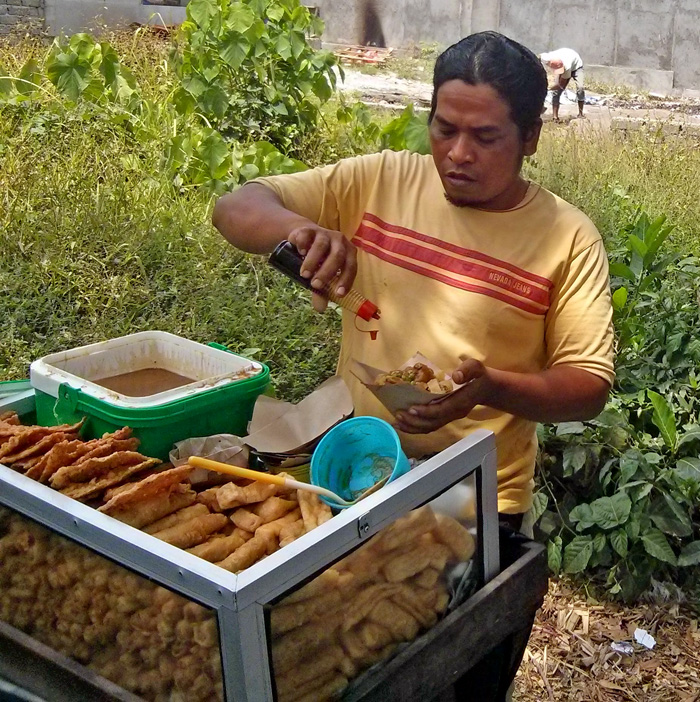The Risks:
When traveling, ingested food and water can be a source of contamination and have the potential to make you sick if care is not taken. The main concern when traveling overseas is "travelers' diarrhoea" which can be caused by a wide range of infectious agents. Other problems you might experience include nausea, vomiting and fever. The likelihood of becoming sick while traveling will depend on a few variables:
- Your destination - are you traveling to a developing country?
- The duration of the visit - a longer time spent in a country increases the risk of contamination
- Standard of accommodation and food hygiene - Destinations where accommodation, sanitation and water quality are of a high standard pose low risk to the health of travelers. This applies to good quality accommodation in most major cities around the world. Destinations where accommodation is of poor quality, hygiene is inadequate and clean water is unavailable may pose a serious risk for travelers. This applies to more rural and remote areas. The risks of illness may be greater in poor countries, however locations with poor hygiene are still present in any country.
- Behavior of the traveler - It is still the traveler's responsibility to take care of themselves while away. The following information will give you some tips on staying safe to avoid getting sick.
Reducing the Risks:
There is risk of food and water borne illness everywhere you go, even with local travel. The stress of travel will reduce your defenses and immunity increasing your risk.
Following are some tips when eating out and preparing food out of your normal environment to help you avoid unsafe food.
Water and drinks:
If there are concerns about the safety of water, always assume the worst.
- Boil drinking water before consuming (at high altitude water boils at a lower temperature, so germs are less likely to be killed)
- Avoid ice in drinks
- Avoid brushing your teeth with unsafe water
- Bottled cold drinks if sealed and unbroken and hot beverages are usually safe
- Use Iodine tablets to treat water to make it safe
 Indonesian street food
Indonesian street foodFood:
If food can be cooked, boiled or peeled it should be ok, otherwise go without.
- When choosing a restaurant choose a place that looks clean and is busy. Avoid buying food from street side vendors
- When eating out make sure that hot food is above the right temperature. Food should be steaming in a bain marie
- When eating out make sure that cold food is cold, and is kept in a fridge or freezer
- Avoid uncooked foods, except for fruits and vegetables that can be peeled or washed in purified water
- Avoid any fruit with damaged skin, and melons as they can harbour nasty germs
- Cook foods like meat loaf, rolled or stuffed meats and whole poultry thoroughly to be sure they are cooked through to the center
- Put leftovers into the fridge immediately for later use, don't allow them to cool at room temperature
- When reheating food make sure it is steaming hot all the way through
- Foods of animal origin are the main source of many food poisoning bacteria, viruses and parasites. High risk foods include poultry, eggs, red meat, dairy products and shellfish.
General hygiene:
- Always wash your hands before eating or handling food, and after going to the toilet or blowing your nose.
- When preparing food always keep raw foods like salads away from foods that need to be cooked like meat, to avoid cross-contamination
- Use separate chopping boards and cooking utensils for cooked and raw foods
What to do if you get sick:
- See a local doctor if available
- Drink plenty of fluids as dehydration is the main danger with diarrhoea
- Take an oral rehydration solution, to compensate for lost minerals and salts from severe diarrhoea
- Stick to a bland diet as you recover
- Rest, you may recover more quickly to get back into training
- Think about what food you have eaten in the last two days to determine what may have caused the problem. Avoid and warn others about this food as well.
Successful traveling is healthy traveling. To reduce your risk of food related illness while overseas plan ahead and take safe measures while eating and drinking. You will more likely enjoy your stay.
Related Pages
- Travel Nutrition & Health
- Nutrition for the traveling athlete
- Is Food Making You Feel Nauseous? Some tips to help


 Current Events
Current Events